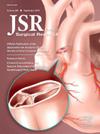Improving Medical Student Surgery Notes Through Near-Peer Targeted Education: A Qualitative Analysis
IF 1.8
3区 医学
Q2 SURGERY
引用次数: 0
Abstract
Introduction
It is necessary for medical students (MSs) to develop proficiency in medical documentation before residency; however, there is limited education focused on this task. We conducted a qualitative analysis of surgical clerkship note evaluations to create an intervention to improve note writing skills and utilized post-intervention assessments to determine the effect on the quality of clerkship student notes.
Methods
An intervention consisting of an in-person senior MS led lecture during the surgery clerkship orientation focused on Subjective-Objective-Assessment-Plan (SOAP) notes was introduced to MS with limited prior note writing education. Examples of complete and accurate surgical SOAP notes were discussed in-person and shared online. Reports from note assessments were analyzed for four clerkship cycles (2 pre-intervention and 2 post-intervention). Descriptive statistics and Fisher's exact tests were performed to compare assessment responses pre-intervention and post-intervention. Thematic analysis was performed on open-ended responses focused on areas for improvement from the anonymized evaluations.
Results
One hundred seventy-one total note assessments were evaluated (85 pre-intervention and 86 post-intervention). Pre-intervention, MS struggled with note organization and lack of inclusion of patient-centered language within their documentation. Post-intervention, students struggled less frequently with flow and chronology of notes but had continued opportunities to improve in concise and organized presentation of information. Students improved in their ability to provide a one-liner, prioritize a differential diagnosis, and organize and structure their notes effectively. Feedback focused on advanced skills including plan specificity, discharge details and parameters, or advanced physical exam finding documentation.
Conclusions
MS improved their SOAP format note writing skills in response to a targeted near-peer led educational intervention. Remaining growth opportunities in note writing skills appear more connected to evolving clinical reasoning and surgery-specific knowledge which can evolve with ongoing exposure and further education.
通过近同伴定向教育改进医学生外科笔记:定性分析
医学生在实习前必须熟练掌握医学文献;然而,专注于这项任务的教育有限。我们对外科见习笔记评估进行了定性分析,以创建一种干预措施来提高见习笔记的写作技巧,并利用干预后评估来确定对见习学生笔记质量的影响。方法采用一种干预方法,在外科见习期间由高级MS亲自授课,重点介绍主观-客观-评估-计划(SOAP)笔记,并对MS进行有限的事先笔记书写教育。完整和准确的外科SOAP记录的例子进行了面对面的讨论,并在网上分享。对四个办事员周期(2个干预前和2个干预后)的笔记评估报告进行分析。采用描述性统计和Fisher精确检验比较干预前和干预后的评估反应。对开放式答复进行了专题分析,重点关注匿名评价中有待改进的领域。结果共进行了171项笔记评估(干预前85项,干预后86项)。在干预前,MS在病历组织和缺乏以患者为中心的语言方面挣扎。干预后,学生在笔记的流畅性和时间顺序方面的困难减少了,但他们有机会继续提高信息的简明和有组织的表达。学生们在提供单句话、区分诊断的优先次序以及有效组织和组织笔记方面的能力有所提高。反馈的重点是高级技能,包括计划特异性、出院细节和参数,或高级体检发现文件。结论通过有针对性的同伴教育干预,sms提高了他们的SOAP格式笔记写作技能。笔记写作技能的剩余增长机会似乎与不断发展的临床推理和手术特定知识有关,这些知识可以随着持续的接触和进一步的教育而发展。
本文章由计算机程序翻译,如有差异,请以英文原文为准。
求助全文
约1分钟内获得全文
求助全文
来源期刊
CiteScore
3.90
自引率
4.50%
发文量
627
审稿时长
138 days
期刊介绍:
The Journal of Surgical Research: Clinical and Laboratory Investigation publishes original articles concerned with clinical and laboratory investigations relevant to surgical practice and teaching. The journal emphasizes reports of clinical investigations or fundamental research bearing directly on surgical management that will be of general interest to a broad range of surgeons and surgical researchers. The articles presented need not have been the products of surgeons or of surgical laboratories.
The Journal of Surgical Research also features review articles and special articles relating to educational, research, or social issues of interest to the academic surgical community.

 求助内容:
求助内容: 应助结果提醒方式:
应助结果提醒方式:


